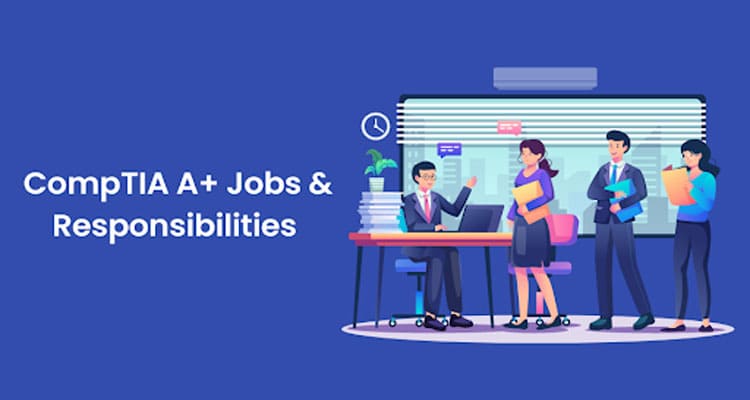CompTIA A+ certification opens up numerous job opportunities for individuals seeking a career in information technology. This entry-level certification provides the foundational knowledge and skills required to work with computer hardware, software, and troubleshooting. In this blog post, we will explore the various CoampTIA A+ jobs and responsibilities that come with this certification.
Jobs
The CompTIA A+ certification prepares you for a variety of entry-level IT jobs, including:
- Help Desk Technician: A Help Desk Technician provides technical support to customers or employees who are having problems with their computer systems or other technology. They assist in resolving hardware and software issues, installing and configuring new software and hardware, and managing user accounts.
- Technical Support Specialist: A Technical Support Specialist assists users in solving technical problems. They may work for a software or hardware company, or they may work for a company that has its own IT department.
- Desktop Support Technician: A Desktop Support Technician is responsible for maintaining and troubleshooting desktop and laptop computers. They also install and configure software and hardware, as well as perform routine maintenance tasks.
- Field Service Technician: A Field Service Technician provides on-site support to customers or clients. They may be responsible for installing and configuring new hardware or software, troubleshooting problems, and performing routine maintenance.
- IT Support Specialist: An IT Support Specialist provides technical support to a company’s employees. They troubleshoot hardware and software issues, install and configure software and hardware, and manage user accounts.
Responsibilities
The responsibilities of someone with CompTIA A+ certification will vary depending on their specific job title. However, there are some general responsibilities that apply to many IT jobs:
- Troubleshooting: One of the primary responsibilities of someone with CompTIA A+ certification is troubleshooting. They are responsible for identifying and resolving problems with hardware, software, and other technology.
- Installation and Configuration: Professionals who hold CompTIA A+ certification have the responsibility of installing and configuring new software and hardware. They must ensure that everything is set up correctly and is working properly.
- Maintenance: IT professionals with CompTIA A+ certification are responsible for performing routine maintenance tasks. This includes tasks such as cleaning computers, updating software, and replacing parts that have worn out.
- Documentation: It is important for IT professionals to keep accurate records of all work that they perform. This includes documenting any troubleshooting, installation, or maintenance tasks that they perform.
- Communication: IT professionals must have strong communication skills. They must be able to explain technical problems and solutions to non-technical people, and they must be able to work collaboratively with other IT professionals.
- Customer Service: In many IT jobs, customer service is an important part of the job. IT professionals must be able to provide excellent customer service, even in difficult or frustrating situations.
Benefits of CompTIA A+ Certification
In addition to opening up a variety of job opportunities, CompTIA A+ certification offers several other benefits:
- Increased earning potential: According to CompTIA, individuals with A+ certification earn an average salary of $61,000 per year.
- Career advancement: CompTIA A+ certification is an excellent starting point for a career in IT. It can also serve as a stepping-stone to more advanced certifications, such as CompTIA Network+ and CompTIA Security+.
- Industry recognition: CompTIA A+ certification is recognized by employers and IT professionals around the world. It is a respected credential that can help you stand out in a competitive job market.
- Improved skills: The CompTIA A+ certification process requires individuals to gain knowledge and skills in several areas of IT. This can help you become a more well-rounded and knowledgeable IT professional.
- Networking opportunities: Pursuing CompTIA A+ certification can help you connect with other IT professionals who have similar interests and career goals. By establishing meaningful connections, you can gain valuable insights and advice that can help you advance your career and achieve your goals.
How to Obtain CompTIA A+ Certification
To obtain CompTIA A+ certification, you must pass two exams: 220-1001 and 220-1002. The exams cover a variety of topics, including:
- Hardware
- Networking
- Mobile devices
- Cloud computing
- Virtualization and remote access
- Hardware and network troubleshooting
To prepare for the exams, you can take a CompTIA A+ certification course or use study materials such as books, videos, and practice exams. You can also gain hands-on experience with computer hardware and software by building your own computer or volunteering to help friends or family with their computer problems.
Once you feel confident in your knowledge and skills, you can register to take the exams through the CompTIA website. The exams can be taken at Pearson VUE testing centers around the world.
After passing both exams, you will receive your CompTIA A+ certification. The certification is valid for three years, after which you can renew it by taking continuing education courses or retaking the exams.
Conclusion
CompTIA A+ certification is a great way for IT professionals to get started in their careers. The certification provides the knowledge and skills necessary to work with computer hardware, software, and troubleshooting. With CompTIA A+ certification, you can pursue a variety of entry-level IT jobs, including Help Desk Technician, Technical Support Specialist, Desktop Support Technician, Field Service Technician, and IT Support Specialist. Regardless of your specific job title, you will be responsible for troubleshooting, installation and configuration, maintenance, documentation, communication, and customer service.





